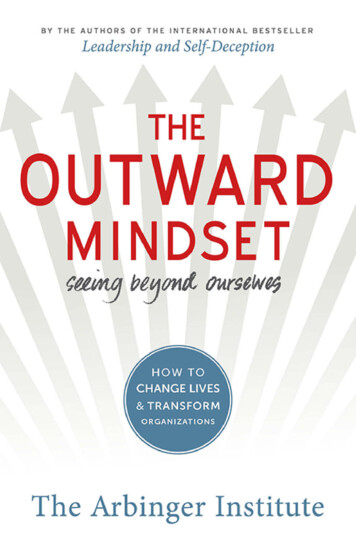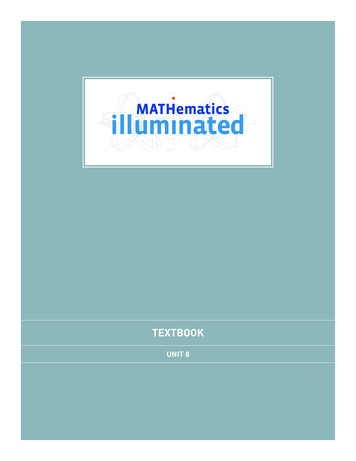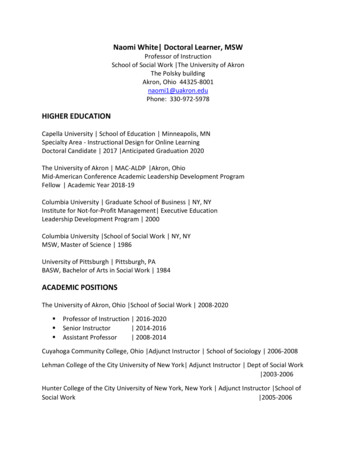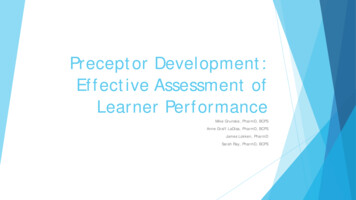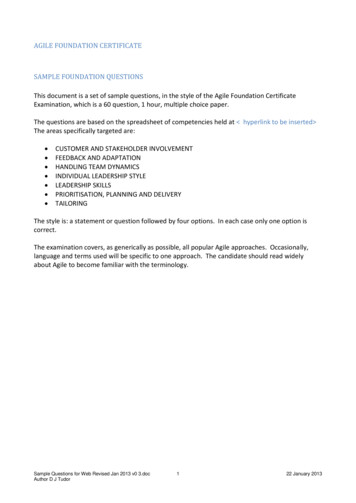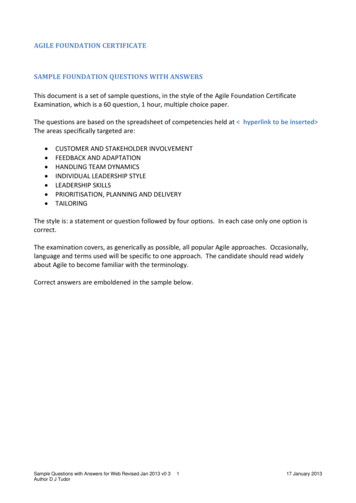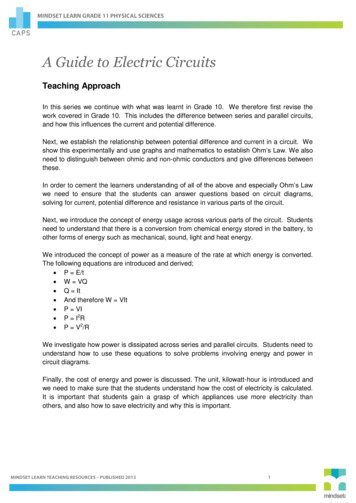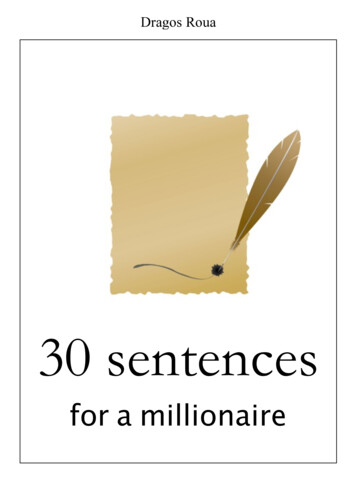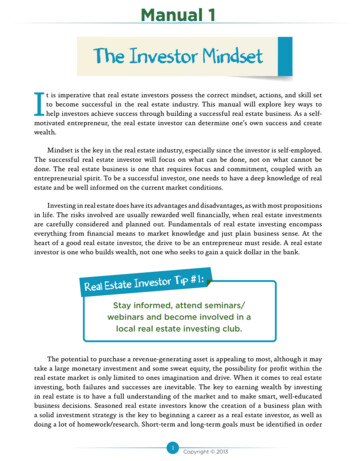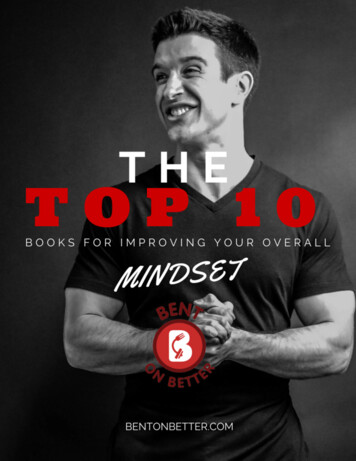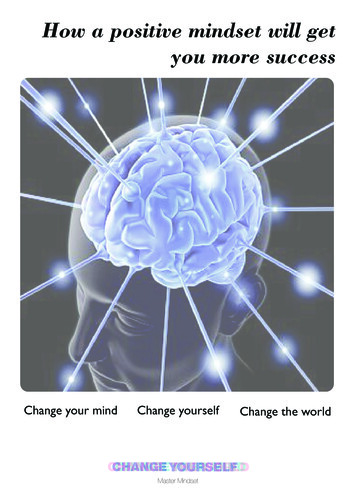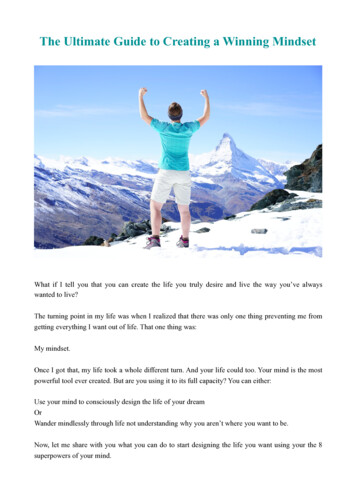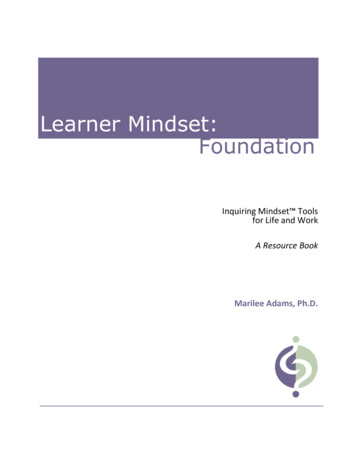
Transcription
Learner Mindset:FoundationInquiring Mindset Toolsfor Life and WorkA Resource BookMarilee Adams, Ph.D.
Learner Mindset: The Foundation ProgramLearner Mindset:FoundationMarilee Adams, Ph.D.Author, Change Your Questions, Change Your LifeInquiry InstituteLambertville, New ht 2012 Marilee Adams, PhD; Inquiry Institute Inc. Lambertville, NJ
Learner Mindset: The Foundation ProgramThe Inquiring Mindset The Inquiring Mindset is the habit, curiosity,and courage of asking open-minded questionsof oneself and others.12 Axioms of the Inquiring MindsetA person with an active Inquiring Mindset operates from the awareness that:1. Questions have more power than answers, both in thinking and communicating.2. Questions are first, then answers.3. Great results begin with great questions.4. Every question missed is a potential crisis waiting to happen.5. Solutions that are not strategic and thoughtful can cause even bigger problems.6. A genuine question is one to which the answer is not already known.7. Successful strategic thinking, information gathering, communication, collaboration, creativity, andchange depend on the quantity, quality, and intention of questions.8. Asking questions of oneself and others is the best defense against assumptions and blindspotsthat compromise relationships and results.9. Asking others constructive, quality questions brings out their best thinking, partnership, action,and results.10. Quality listening is essential to the process of effective question asking.11. Mindset trumps questions.12. Whatever the situation, an active Inquiring Mindset is your best ally for successful and satisfyingrelationships and results.2Copyright 2012 Marilee Adams, PhD; Inquiry Institute Inc. Lambertville, NJ
Learner Mindset: The Foundation ProgramSome Thoughts about Change and LearningThere is . . .no progress without changeno change without learningno learning without questionsno questions without curiosityno curiosity or questions without an active Inquiring Mindset.* * * * *Great results begin with great questions.Change and learning generally depend on the quantity, quality,and intention of the questions we ask ourselves and each other.Every question missed is a possible crisis waiting to happen.You have your questions – or your questions have you.Blame keeps us stuck in the past.Responsibility paves a path for a better future.The person who wants a change is responsible for the change.We’re all recovering Judgers.You have your Judger – or your Judger has you.Judger begets Judger and Learner begets Learner.No one can help anyone else from a Judger place.Judger denied can become Judger squared.Judger mindset impedes both teaching and learning.Learner mindset facilitates both.Accept Judger and practice Learner -- moment by moment by moment.It’s as important for classrooms and teams as it is for individuals.Switching questions are what make learning, change, andprogress possible. Switching is where the action is!-- Marilee Adams3Copyright 2012 Marilee Adams, PhD; Inquiry Institute Inc. Lambertville, NJ
Learner Mindset: The Foundation ProgramProprietary Materials and InformationThe Materials and Information presented during the Inquiring Mindset Workshop either orally orin writing, are the proprietary property of Marilee Adams, Ph.D. and the Inquiry Institute. Youmay not reproduce, copy, or otherwise duplicate, or distribute, lend to or otherwise transfercopies of any of the Materials or Information, without the express written permission of MarileeAdams, Ph.D. and the Inquiry Institute.Any Materials and Information presented in the Program is intended solely for use in theProgram.Additionally, you may not sell, modify and sell, resell, or repackage and sell any of the Materialsor Information nor deliver the Materials themselves either reproduced or modified, as part ofany seminar, training program, workshop, consulting or similar business activity either free orfor the purpose of financial gain.Requests concerning licensing of Materials and Information should be sent to Inquiry Institute atInfo@InquiryInstitute.com .By participating in this Program or Workshop, you agree to the conditions herein.Copyright 2012 by Inquiry Institute Inc.All rights reserved. No part of this publication may be reproduced, stored in a retrieval system ortransmitted in any form or by any means, electronic, mechanical, photocopying, recording orotherwise without prior written permission from the Inquiry Institute Inc.Kim@InquiryInstitute.com or 800-250-78234Copyright 2012 Marilee Adams, PhD; Inquiry Institute Inc. Lambertville, NJ
Learner Mindset: The Foundation ProgramTable of ContentsSECTION 1: Power and Potential of Questions Section 1 Power and Potential for QuestionsTop 12 Reasons to Ask Questions . 8The Adams Model of change . 9Question Reluctance . 10The Clamor for Answers . 11Relationship of Questions and Results . 12Guidelines for Asking Questions Effectively . 13Alternative Ways of Asking "Why" . 15What is Question Thinking? . 16Inquiring Mindset Model . 17Top Twelve Questions for Success. 18Section 2 Worksheets for LearningLearning Type 1 and Type 2 . 20Scenario for Learning, Reflection and Action . 21Goals that Work . 24Curiosity Assessment . 25Notes and Reflections . 26Section 3 The Inquiring Mindset The Learner/Judger Mindset Model . 29Anatomy of Judger . 30The Choice Map . 31Using the Choice Map . 32Switching Questions . 33ABCD Process . 34Question Thinking and Emotional Intelligence . 35The Positivity Mindset . 365Copyright 2012 Marilee Adams, PhD; Inquiry Institute Inc. Lambertville, NJ
Learner Mindset: The Foundation ProgramSection 4 The Inquiring Team and Communication that WorksListening . 38The Importance of Trust in the Workplace . 39The Inquiring Leader . 40The Inquiring Organization . 42Win-Win Requests . 43Q-Prep . 44Question Map for Meetings and Conversations . 46Critique and Correct Process . 47QT Suggestions for Meetings and Conversations . 48Q-Storming and the New Possibilities Model . 49Guidelines for Q-Storming . 50A Team Discovers Missed Questions . 52The Five Questions . . 53Section 5 ResourcesReading Suggestions . 55Let Us Inquire Together . 57About Marilee Adams, Ph.D. . 58Resources from The Inquiry Institute . 59Section 6 Cultivating the Inquiring MindsetHomework for Day 2Emotional States MenuAdvancing and Strengthening the Inquiring MindsetSection 7 TelelabsIMF TelelabsSection 8 Journal pagesIMF Journal PagesGreat results begin with great questions!6Copyright 2012 Marilee Adams, PhD; Inquiry Institute Inc. Lambertville, NJ
Learner Mindset: The Foundation ProgramSection 1Power and Potential of QuestionsTop 12 Reasons to Ask Questions . 8The Adams Model of Change . 9Question Reluctance . 10The Clamor for Answers . 11Relationship of Questions and Answers . 12Guidelines for Asking Effective Questions . 13Alternative Ways to Asking “Why" . 15What is Question Thinking ? . 16Inquiring Mindset Model. 17Top 12 Questions for Success . 187Copyright 2012 Marilee Adams, PhD; Inquiry Institute Inc. Lambertville, NJ
Learner Mindset: The Foundation ProgramTop Twelve Reasons to Ask Questions“Despite the omnipresence of questions in our lives, few people are fully aware ofthe potential and power inherent in them. Perhaps this is because, somewhat likethe wind, it is their effect, rather than their presence, which is often mostconspicuous.”Marilee Goldberg Adams: The Art of the QuestionThis list is based on three assumptions:1. A genuine question is one to which the answer is not known.2. Curiosity is the driver of open-minded questions.3. The questions are intended in a constructive manner, i.e. not to intimidate, prove beingright, nor demonstrate how much one knows.Among the top reasons we ask questions are to: Gather information Build and maintain relationships Learn, teach, and reflect Think clearly, critically, and strategically Challenge assumptions Listen to understand, verify, and clarify Solve problems and make decisions Negotiate and resolve conflicts Set and accomplish goals Take charge and focus attention Create and innovate – open new possibilities Catalyze productive and accountable conversation and action8Copyright 2012 Marilee Adams, PhD; Inquiry Institute Inc. Lambertville, NJ
Learner Mindset: The Foundation Program9Copyright 2012 Marilee Adams, PhD; Inquiry Institute Inc. Lambertville, NJ
Learner Mindset: The Foundation ProgramQuestion ReluctanceMost of us experience question reluctance in some form and at some times. Question reluctancebehaviors usually represent an avoidance and/or discomfort with asking questions (and oftenwith answering them). Consider this: Have you ever been in a situation, either professional orpersonal, had an important question to ask, and did not ask it? Virtually everybody answers,“Yes.” Tha
A Resource Book Marilee Adams, Ph.D. Foundation Learner Mindset: . These guidelines presume a mindset that is open-minded, genuinely curious, desirous of learning, and intending a positive outcome for both parties. There are no absolute rules _ in question asking, since the best questions must always factor in context, relationship, and intentions. The general goal is to ask a question .
